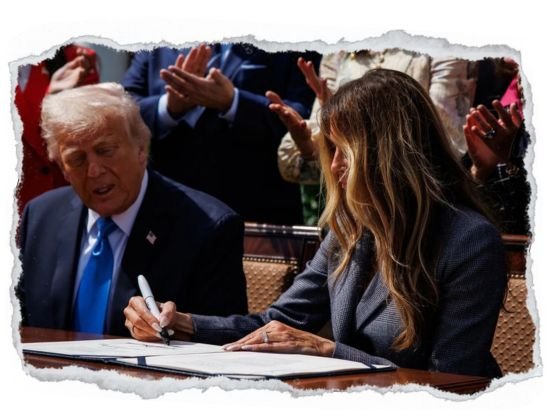
Washington D.C., May 20, 2025 – U.S. President Donald Trump and First Lady Melania Trump have officially signed the Take It Down Act, a groundbreaking federal law aimed at combating revenge porn and protecting personal privacy in the digital age.
The new law criminalizes the non-consensual sharing of intimate images, videos, or deepfakes online—whether for revenge or coercion. Websites and social media platforms will now be legally required to remove flagged content within 48 hours of receiving a complaint.
According to White House Press Secretary Caroline Levitt, the First Lady played a key role in lobbying for the bill’s passage. In March 2025, Melania Trump met with U.S. senators to build bipartisan support for the legislation. Her advocacy helped secure unanimous approval from the Senate.
“This is a significant victory for online privacy and human dignity,” said Levitt. “Melania Trump’s leadership was instrumental in turning this proposal into law.”
The Take It Down Act includes specific rules:
Platforms must remove flagged content (photos, videos, deepfakes) within 48 hours.
Duplicate content must also be removed proactively.
Threatening to share private images is treated the same as actually sharing them.
Advanced AI-generated content like deepfakes is included in the law’s scope.
The bill targets not only websites but also places the burden on tech platforms and social media giants to act swiftly once notified.
While several U.S. states already had laws against revenge porn, this new federal act creates a nationwide legal standard. For the first time, online platforms operating across the U.S. face direct federal accountability in these cases.
The law aims to fill gaps where state-level protections were inconsistent or unenforced. With this federal backing, victims will now have a more reliable path to justice and content removal.
Despite unanimous Senate approval, the bill has sparked some criticism from civil liberties advocates. Opponents argue that the law could lead to overreach, potentially censoring consensually shared adult content, including LGBTQ material, or infringing on free expression.
Some digital rights groups warn the bill could allow the government to monitor private online behavior more closely, under the pretext of protecting individuals from exploitation.
However, supporters of the law say the focus remains clear: to empower victims and ensure timely removal of harmful, unauthorized content—especially in an era where AI-driven deepfake porn has become a growing threat.
The Take It Down Act represents a rare example of strict regulation imposed on tech companies under the Trump administration. It signals a shift toward holding internet platforms more accountable for harmful content.
The White House emphasized that the law is not about curbing free speech but about safeguarding privacy, dignity, and consent in the digital realm.
As the act comes into force, platforms across the U.S. will be under close scrutiny to ensure compliance—and victims of revenge porn may finally get a faster path to justice.